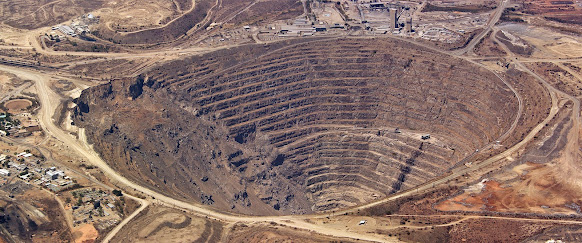Resolution Copper wants to dig 5,000 to 7,000 feet into Arizona's Oak Flat desert to mine the region's vast copper-molybdenum deposit. The resistance to the project by Native American tribes and religious groups goes just as deep.
The Resolution Project has been under development by mining behemoths Rio Tinto and BHP Group since 2002. The companies and project supporters insist extracting the region's copper deposit is vital to shore up the mineral competition with China and for the U.S. transition to renewable energy. The opposition sees the mine and its expected 2-mile-across crater as exploitation of tribal holy ground.
Overall, the project has powerful backers: "It has generally been supported by the Obama, Trump and Biden administrations, though the latter has asked for more study as it seeks to balance its desire for clean-energy supplies with protections for the environment and the interests of Native Americans. The project can’t advance until that study is completed," report Phred Dvorak and Rhiannon Hoyle of The Wall Street Journal. "Many state and local officials [also] back the project."
Resistance to the project centers on Oak Flat, a stretch of land many Apaches consider sacred ground. The entrance to the mine is on Oak Flat, with the copper thousands of feet below. The main Apache opposition group, known as Apache Stronghold, was formed by the Apache San Carlos tribe and is represented by the Becket Fund, "a high-powered Washington, D.C., law firm known for championing conservative causes," Dvorak and Hoyle write. "Becket said it is planning to take its fight to the Supreme Court, where it has an 8-0 record."
Once Apache Stronghold and Becket joined forces the cause gained "a host of new religious allies. . . . Scores of religious groups have also submitted amicus briefs supporting Apache Stronghold’s suit," the Journal reports, "including organizations representing Mennonites, Seventh Day Adventists, Sikhs and Muslims."
Meanwhile, Resolution developers say "they have invested in an extensive monitoring network for groundwater, springs and other bodies of water that will be checked by regulators and a community working group," Dvorak and Hoyle add. "Resolution’s owners are trying to honor that commitment by consulting and joining with local tribes in good faith for the duration of the project, said Gare Smith, a lawyer who focuses on human rights and advises the project’s owners."
Not all regional tribes oppose the mine. "Other local tribes are attracted by potential economic benefits in a state where the tribal poverty rate is 29%," the Journal reports. "Among the ones with ties to Oak Flat, most have at some time officially opposed the mine."
To read more about U.S. copper needs, click here.
To find out more about the animals and plants that are native to Oak Flat, click here.

No comments:
Post a Comment